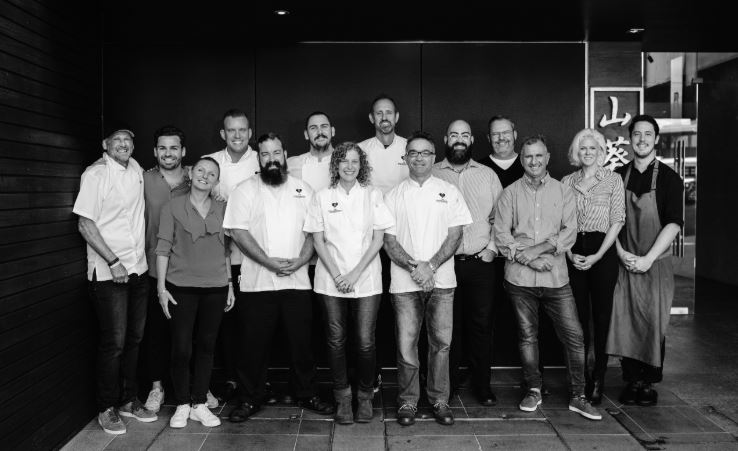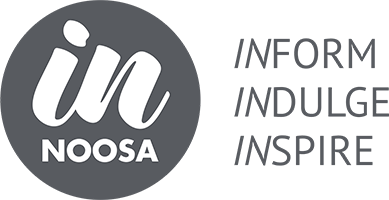
What Is The White Jacket Effect?
Noosa prides itself as a foodie destination but are we looking after our chefs enough? Matt Golinski shares his insights into the pressure-cooker environment and a national program that is leading the conversation.
It’s 5.45 on Friday evening.
There’s about 100 people booked for dinner, and in the reservations book they all seem pretty well spaced out, although you know from experience that it’s fairly likely that all the 6.30 bookings will be late, and the 7.30 bookings will be early; meaning that at 7.00 there’ll be a frantic push to get everyone seated, settled and watered, a flurry of menus and napkins, and then a constant flow of orders spewing from the docket machine.
The dishy called at 5.00 to say they couldn’t make it in (insert excuse here) and none of the other dishies are answering their phones because they know exactly why you’re ringing. So you’ve pulled someone off a section to do dishes, leaving you a person short to cook.
The char grill broke during lunch service, but you’ve managed to MacGyver it back together using a wooden spoon and some wire. The first order comes in: one fish, (but with the chicken garnish please); 2 steaks, 1 medium rare, 1 medium (but no blood please), (sauce on the side please); 1 spaghettini (no onion or garlic. Not allergic, just don’t like it).
For three or so hours, you and the team, both back of house and front of house, try desperately to make every one of those 100 guests feel special and give them a dining experience to remember for all the right reasons. But two tables waited too long, and Mr Spaghetti felt the dish lacked flavour.
You apologise profusely for ruining their day, pack up your section, clean down, write a prep list for the next day, do the ordering, and then come back and do it all again the next day.
Now don’t get me wrong, I, like most people I know in the hospitality industry, do the job because I love the pleasure of being creative and making people happy, and the adrenalin rush of a busy service is an addiction we all grow to enjoy.
But the daily stress of restaurant life can take its toll, and there has always been a culture of self-medication with alcohol and drugs in the industry.
Chef Amber Kaba is no stranger to the pressures of striving for perfection in some of the best restaurants in the world, (including the iconic Quay restaurant in Sydney), and the effect that pressure can have on a person’s mental health long term.
Amber relied on alcohol to help cope with the weight of the expectations that were placed on her, and when she eventually hit rock bottom, she recognised that she needed to reach out for help to get her life back on track.
She hasn’t had a drink for two years.
When her chef mentor and friend (and much-loved member of the Noosa food community) took his life earlier this year, Amber decided it was time to start a serious conversation about mental health in the hospitality industry, and as a consequence, The White Jacket Effect was born.
In a business where we’ve traditionally been told to ‘toughen up princess’, The White Jacket Effect aims to empower hospitality workers with the mental health tools to help themselves and their workmates, and normalise the process of reaching out and having it be accepted in the workplace.
In partnership with restaurants in Sydney, Noosa, Canberra, Melbourne and Brisbane, Amber is currently touring the campaign, gathering discussion groups of chefs and front of house staff to raise awareness of the issues of anxiety, depression, suicide and substance abuse that are an ever-increasing problem in our line of work.
The accommodation and food services sector is the fifth biggest employer in Australia and about 80 per cent of
hospitality workers surveyed by R U OK? are concerned about mental health challenges. In Noosa, the sector accounts for more than 15 per cent of the local workforce.
Noosa’s first White Jacket Effect event was held at Wasabi Restaurant and featured a panel of industry professionals
sharing their experiences, current best practices to deal with mental health issues and the business and personal impacts of sweeping issues under the carpet.
A guest speaker from Mental Health Australia talked about different tools people can use in these situations, including the concept of a Mental Health First Aid Officer.
Wasabi Restaurant and Bar executive chef and co-owner Zeb Gilbert said working long hours, nights and weekends
could be isolating.
“It was great to see so many fellow chefs and hospo team come together, share a meal in a casual environment and support one another to bring about positive change,” he said.
The 45 attendees raised over $3000 through silent auctions which went back into The White Jacket Effect to continue empowering and supporting the Hospitality Industry.
Amber said The White Jacket Effect was in the process of developing packages to lift the mental health of businesses.
In the long term, she hoped to see mental health first aid integrated into training, and become a part of every
workplace, just like regular first aid.
If you or anyone you know needs help call:
beyondblue on 1300 22 4636
Lifeline on 13 11 14
Headspace on 1800 650 890
Suicide Call Back Service on 1300 659 467



